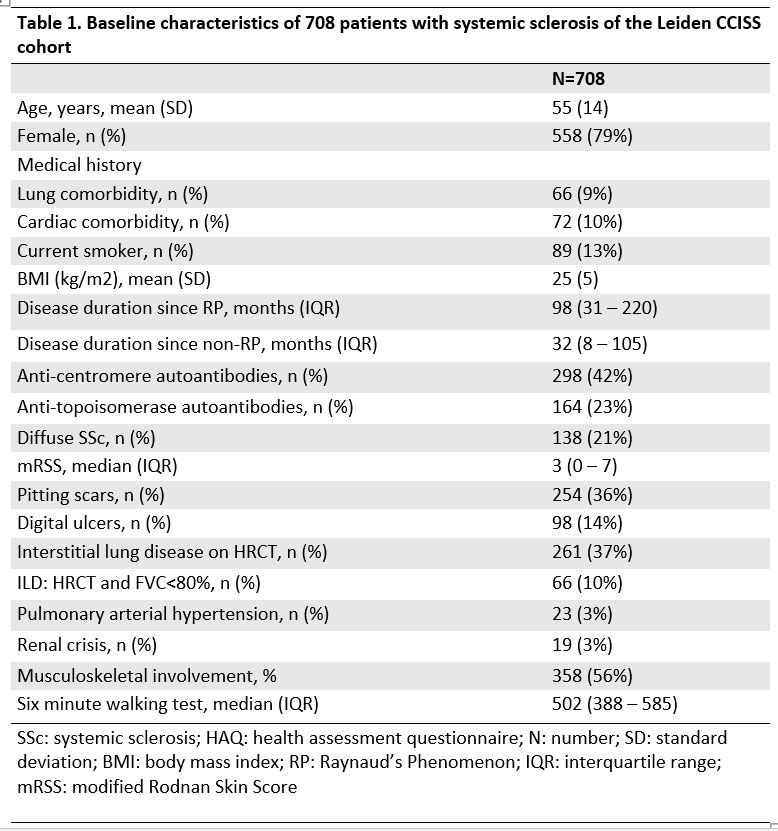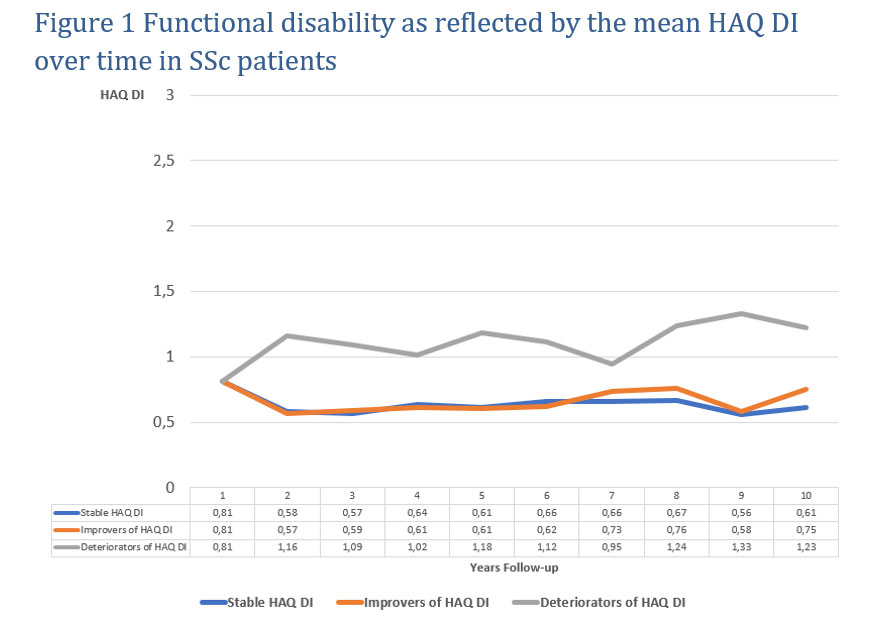Session Information
Date: Monday, November 14, 2022
Title: Systemic Sclerosis and Related Disorders – Clinical Poster III
Session Type: Poster Session D
Session Time: 1:00PM-3:00PM
Background/Purpose: Functional disability in patients with systemic sclerosis (SSc) greatly influences quality of life. In SSc, the goal of treatment is to decrease disease burden and improve HRQoL. Therefore, it is important to gain insight in the longitudinal course of functional disability in SSc patients from cohorts reflecting the complete SSc spectrum, and especially identify patients who progress in functional disability. Taking advantage from 10-year follow-up data of the Leiden Combined Care in SSc (CCISS) cohort, which has included SSc patients in accordance with the ACR/EULAR 2013 criteria from its beginning, this study investigated associations between functional disability and clinical characteristics at baseline, and most importantly, which patients show progression in functional disability over time.
Methods: SSc patients from the Leiden CCISS cohort were included. Functional disability was assessed annually using the Scleroderma Health Assessment Questionnaire (SHAQ), which ranges from 0 (=without difficulty) to 3 (=unable to do). To assess baseline associations between clinical characteristics and functional disability, linear regressions were performed. The minimal clinical important difference of the HAQ is 0.22. Per visit, the change in HAQ was calculated using the previous visit; and progressors (change > +0.22) were identified. To identify possible associations between SSc characteristics and progressors of functional disability over time, multi-level mixed-effects logistic regressions were performed.
Results: 708 SSc patients were included, with a median follow-up duration of 4 years, in total 2674 HAQ assessments and mean baseline HAQ of 0.81 (SD:0.68).
At baseline, linear regression showed that diffuse cutaneous subset (β:0.34, p< 0.001), digital ulcers (β:0.22, p=0.004), pulmonary arterial hypertension (β:0.45, p=0.003), and musculoskeletal involvement (β:0.40, p< 0.001) were significantly associated with the HAQ.
Over time, for the whole cohort, the HAQ increased slightly for the total group (+0.016 [95% CI: 0.008 ; 0.024]), which is clinically not meaningful. Over time, 397 (21%) of the HAQ assessments showed improvement more than the MCID of the HAQ, 462 (25%) progressed more than the MCID of the HAQ, and 991 (54%) remained stable. The 462 HAQ progressions occurred in 291 of the 708 (41%) SSc patients.
SSc patients with an age above 65 years (OR: 1.4, 95% CI 0.98 ; 1.90), modified rodnan skin score above 15 (OR: 1.8, 95% CI 1.14 ; 2.96), pulmonary arterial hypertension (OR: 2.0, 95% CI 0.96 ; 3.98), interstitial lung disease on HRCT and a forced vital capacity < 80% (OR: 1.5, 95% CI 1.01 ; 2.14), and musculoskeletal involvement (OR: 1.3, 95% CI 1.05 ; 1.73) had a higher risk to progress in the HAQ over time, compared to SSc patients with a stable HAQ.
Conclusion: Over time, 40% of SSc patients show important progression of functional ability. Main disease related determinants include skin, pulmonary and musculoskeletal involvement. These data underline the high unmet need for improved treatment of SSc.
To cite this abstract in AMA style:
Liem S, Ahmed S, Huizinga T, Vliet Vlieland T, Bergstra S, de Vries-Bouwstra J. Evaluation of Functional Disability over Time in the Leiden Systemic Sclerosis (CCISS) Cohort [abstract]. Arthritis Rheumatol. 2022; 74 (suppl 9). https://acrabstracts.org/abstract/evaluation-of-functional-disability-over-time-in-the-leiden-systemic-sclerosis-cciss-cohort/. Accessed .« Back to ACR Convergence 2022
ACR Meeting Abstracts - https://acrabstracts.org/abstract/evaluation-of-functional-disability-over-time-in-the-leiden-systemic-sclerosis-cciss-cohort/


